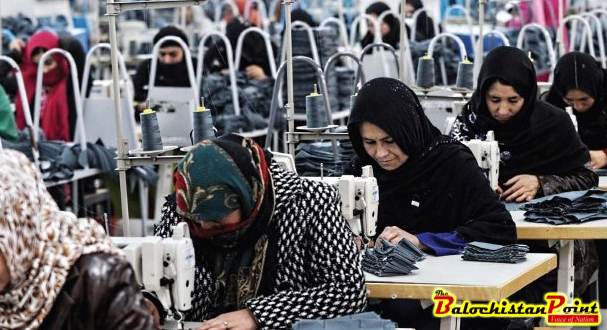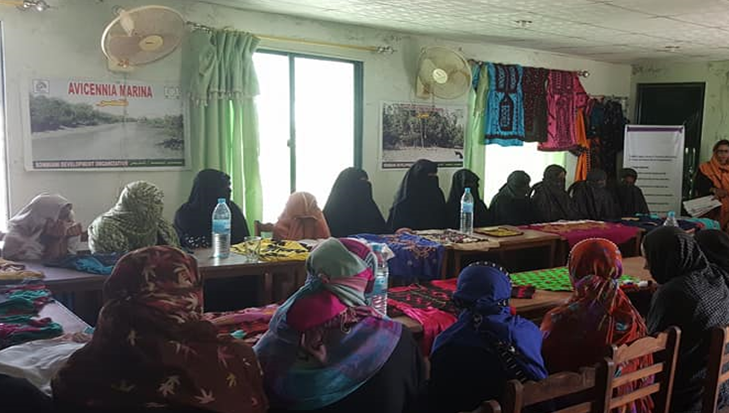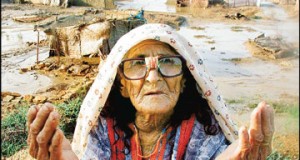By: Ejaz Magsi
There is no training activity for women working in the factories in Balochistan, so their awareness of labor rights is only a dream. These working women, like other parts of the country are prone to sexual harassment and discrimination. The situation of public transport is very grim, though there are partitions, but often women feel uncomfortable while traveling by the coaches and busses.
On the other hand, only few large organizations have provided separate toilets, but the child care facility is totally nonexistent. There is no bus stop with shads, only one in front of Gatron industries exists, but that too is far from work places, and built for all genders without any partition. While in hub city there is only one waiting shad for women. As factory workers come from different areas and they use different waiting stop so there should be many waiting shades according to their need.
Women are almost on the same status as that of men in context of the labor rights. Mostly there is no implementation of labor laws in any factory of Hub. Low salary package, Contract system, Lack of health and hygiene conditions, and lack of safety dress, are the major issues and in violation with labor law.
The home based/cottage industry mostly involves sewing activities, but now, with the advent of Sohb Marble Training, the cottage industry is expected to see at least 675 women entrepreneurs within the Hub alone. Most women work at their home in groups and they do embroidery.
Law and Order situation is another challenge as the supply chain from raw material to finished goods is often disturbed by regular law and order conditions. Other major challenges faced by women include: Market linkages, exploitation by the middle men.
Majority of the women workers are local of Lasbela district and many of them comes from nearby villages to work in factories. They have been working in these factories for last five years or more in many cases and have deep inside of the environment they work in regarding the salaries, recruitment, policies and procedures. Local job market is not very much friendly for women workers as it is not providing as many jobs as many provided to men. Out of 200 factories in the district only 10 of those are providing job opportunities to women workers. There is a visible gender discrimination prevailing in the work market as women marital status is also considered while offering her job. Unmarried or single women are given preference over married women.
Women do not have any access to job advertisement or openings but they are dependent on male members of the family to get to know about new opportunities. One of the reasons of this gender biased is lack of education or low literacy among women and they cannot even read newspaper in case vacant positions are advertised through print media, secondly poverty also curtails women or in many cases men too exercise this facility to have or purchase a newspaper. Men case is little different as they have mobility in the town and they can read newspapers at tea stalls or restaurants or any other public place where men usually get together in the evenings.
The role of middle man or agent is quite critical and at times discouraging too for women workers. Middle man not only exploits the work opportunities but also try to negotiate salary/wages on less rates and demand for high commission from these women.
There is no such practice to organize interviews for women in general for jobs and if some employers do organize some, women are not comfortable with the structure or interview and the questions being asked. Women feel harassed and interference in their privacy and therefore many women drop the idea to appear in interview and search for some other jobs.
Job security is another one of the major concerns of women as both the formal and informal sectors expect few international firms do not exercise any prior notice practice to employee to ask him/her to quit or leave the job.
Extreme poverty and gender biases further worsen the situation as employers do not find it mandatory to make a written agreement for jobs or pen down terms of references for the job they offer to men or women in their factories. So it is a verbal contract between two parties the employer and the employee irrespective of gender. However, women are given less salary for the same work men do and women work hours are also more than the men do. It does not mean that men are given the minimum wage/salary set by labour laws but at least they get more what women get for the same work or in some cases even more working hours. Normal working hours per day are 7 to 8 for both men and women but women are usually kept engaged longer than normal hours and they work for 8 to 10 hours and no over time is paid to them.
The level of interest of women worker is compromised as both the sectors formal and informal do not offer much opportunities to them and they do not have many alternative options especially women from religious minorities have to compromise on wages, working conditions and working hours too. Women from religious minorities feel threaten and do not dare to complain if anything goes wrong or bad in terms of low salaries and extra working hours etc. In some cases women really want to go for non-traditional jobs to earn more and to enhance their level of satisfaction such as opening shops, restaurants and boutiques. These ideas of women are discouraged by fairly conservative culture and social norms in the area where women are associated with the traditional jobs and always be depended on male partners.
Women can avail two leaves a week normally in formal sector but in informal sector it shrinks to one leave a week or sometimes not even single off from work. Women rights are neglected badly and there is no concept or practice of paid maternity leaves. The only favor given by the employers is that women can get back to work after their maternity periods over but again it is not ensure it depends on the available opportunities.
Except a few international firms/factories there is no health or life care insurance or EOBI polices exist and if women get sick or injured there is no compensation from the employer. The situation is also not very welcoming when it comes to perks and bounces for the employees. Women in particular and men in general do not get any performance appraisal or promotions or benefits based on their good performance they keep on working on the same fixed wages/salaries set by the employer. Good human resources management practices are rare in the area, women workers from both formal and informal sector have no access to loans or micro credits to support their families or to uplift their lifestyle. If any of 200 factories provide loans in terms of advance salaries they do charge high interest rate and it becomes another form of human salary where generations and generations cannot pay back the principle amount of the loan rather exhausted all earnings to settle the interests.
Commuting and exhausted condition of public transport is equally bad irrespective of gender division. However, women suffer more while using public transport for commuting from their homes to their work places. Majority of women come from far remote villages where they have to travel many of kilometers by walk and then they reach to nearest bust stop to catch the bus to go to work. Risk increases when women come home in evening especially if they are doing over time in factories and their respective work places.
Some of the employers do provide transportation facility to women from their homes to work place but that is not covering all the women workers.
Work place sanity and safety is yet again a big challenge for working women in these areas of district Lasbela. Some of the factories such as glass and marble do provide safety kits and gloves etc. but to get new kits is not an easy task the middle man or the labour agent has to give favor to an employee to get it in case if kits get damaged.
Women do not have the facility of separate washrooms or prayer rooms or rest rooms at their work places, it is not with women only but men who are provided with toilet/wash room facility the condition of those toilets and washroom is highly unhygienic does not applicable to basic sanitation conditions.
Considering the role of these working women being mothers is also not well taken and there are no arrangements found for baby day care center at these work places. In fact the kitchen which is one of the most important parts of any work place is found dirty and highly unhygienic and with no water and sanitation facility available at all
Women working in both informal and formal sector do not have any awareness or knowledge about anti-harassment or sexual act. However they do face sexual harassment at work place and also on their way to home especially if they commute in public transport. There are no such practices found where women register their complaints against harassment but they do share among their female colleagues and friends. Women do not trust the factories management that they would not listen them or would give any penalty to the culprits. In worst case women quit their jobs without sharing the reason of being sexually abused or harassed at work place.
No proactive measures are taken at these factories to protect women from any kind of sexual abuse or assault. This situation not only decreases the women employment opportunities but also affect their job security and in result they face unemployment and they never get rid of poverty.
Gender roles are relative to the area and its local culture and customs and here the economic contribution hardly makes any difference in women empowerment at work place or home. Similarly, this study found that woman gives her earnings to head of the family. Her salary goes to her father in case she is unmarried or single living with her parents and earning goes to her husband if she is married.
All the decisions are made by the male members of the family including the marriage decision for a girls/woman is made by her father or elder brother. In some case old women at homes like grand mothers are consulted before making decisions but the final word comes from the male member.
Women are allowed to spend a petty share of their income on themselves like to buy some clothes or jewelry but that is not very often it is for occasions and festivals only. Women who are married and have kids do spend money on their kids and interesting their preference is to spend as much money as they can on their children’s’ education.
Level of awareness and knowledge about women/human rights is found very low in the group this study focused on. Women know very little about human rights or women rights, they watch or hear about these terms on media like TV or radio. This ignorance about rights further leads obliviousness about labour rights, the terms women protection, anti-harassment act, labour laws, minimum wage standards, paid holidays especially paid maternity leaves are not known to women. They do not understand what actually it does mean even if they have heard about these terms.
There is no concept of women participation in labour unions or trade unions. Women are never involved in decision making at work places and therefore their very basic needs such as having separate washrooms/toilets or day care center are ignored. Women lack of participation leads to gender biased policies and structure for recruitment and other work related decisions.
Published in The Balochistan Point on March 26, 2018
 Balochistan Point Voice of Nation
Balochistan Point Voice of Nation





